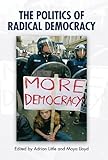The Politics of Radical Democracy / Adrian Little, Moya Lloyd.
Material type: TextPublisher: Edinburgh : Edinburgh University Press, [2022]Copyright date: ©2008Description: 1 online resource (240 p.)Content type:
TextPublisher: Edinburgh : Edinburgh University Press, [2022]Copyright date: ©2008Description: 1 online resource (240 p.)Content type: - 9780748633999
- 9781474470308
- 321.8
- online - DeGruyter
| Item type | Current library | Call number | URL | Status | Notes | Barcode | |
|---|---|---|---|---|---|---|---|
 eBook
eBook
|
Biblioteca "Angelicum" Pont. Univ. S.Tommaso d'Aquino Nuvola online | online - DeGruyter (Browse shelf(Opens below)) | Online access | Not for loan (Accesso limitato) | Accesso per gli utenti autorizzati / Access for authorized users | (dgr)9781474470308 |
Frontmatter -- Contents -- Acknowledgements -- Notes on the Contributors -- Introduction -- 1. Rhetoric and Radical Democratic Political Theory -- 2. Performing Radical Democracy -- 3. Aboriginal Sovereignty and the Democratic Paradox -- 4. Judith Butler, Radical Democracy and Micro-politics -- 5. Post-structuralism, Civil Society and Radical Democracy -- 6. Hegemony and Globalist Strategy -- 7. Is ‘Another World’ Possible? Laclau, Mouffe and Social Movements -- 8. Friends and Enemies, Slaves and Masters: Fanaticism, Wendell Phillips and the Limits of Agonism -- 9. The Northern Ireland Paradox -- Conclusion -- Bibliography -- Index
restricted access online access with authorization star
http://purl.org/coar/access_right/c_16ec
This book addresses the idea of radical democracy and, in particular, its poststructuralist articulation. It analyses the approach to radical democracy taken by a number of contemporary theorists and political commentators, including Ernesto Laclau and Chantal Mouffe, Judith Butler, William Connolly, Jacques Rancière, Claude Lefort, Sheldon Wolin, Michael Hardt, and Antonio Negri, and Giorgio Agamben. By examining critically the accounts of democracy advanced by these theorists, this volume explores how a more radically conceived theory of democracy might be extended in a more egalitarian and inclusive direction.The strand of radical democracy examined in this book is defined by a number of characteristics:Democracy is conceptualised understood as a fugitive condition, being open to perpetual disruption and reinventionThe relationship between the state and civil society is regarded as the site where the open-ended 'promise' of democracy is fought outThere is an emphasis on questions of political renewalThere is a deep suspicion of identity-based political claimsPolitics is conceived as either the site of or as one of the mechanisms for identity construction Democratic politics is understood as a politics of contestation and disagreementDemocracy is regarded as always at least partially conflictual and not a means through which violence and conflict can be permanently eradicatedThere is a deep suspicion of identity-based political claimsThe political is assumed to be ontologically conflictual, with such conflict being understood as ultimately ineradicable from politics, though the form it takes necessarily varies from time to time and context to contextThe book clarifies the concept of radical democracy by mapping the field, and elaborates it further through a critical engagement with the works of its key proponents. In addition, it draws on the insights of radical democratic theory to explore a range of concrete political cases (e.g. the struggles of indigenous people, same-sex marriage, societies emerging from prolonged social and political strife, and the role of social movements in opposing processes of globalization) in order to illustrate its practical nature.Key FeaturesDraws on the work of a range of thinkers including including Ernesto Laclau and Chantal Mouffe, Judith Butler, William Connolly, Jacques Rancière, Claude Lefort, Sheldon Wolin, Michael Hardt, and Antonio Negri, and Giorgio AgambenUses case studies such as the struggles of indigenous people, same-sex marriage, societies emerging from prolonged social and political strife, and the role of social movements in opposing processes of globalization - this blending of theory with practical political analysis helps locate and explain sophisticated theoretical ideasClear exposition of key arguments in radical democratic theoryExplains the implications of radical democracy for different levels of political organisation
Mode of access: Internet via World Wide Web.
In English.
Description based on online resource; title from PDF title page (publisher's Web site, viewed 29. Jun 2022)


